Analyzing Recovery: Perspectives in Mental Health and Wellbeing
VerifiedAdded on 2023/06/09
|8
|2469
|271
Essay
AI Summary
This essay delves into the multifaceted concept of recovery in mental health, moving beyond traditional definitions to encompass a holistic approach to patient wellbeing. It explores the evolution of recovery, emphasizing the importance of patient empowerment and control over their lives despite mental health conditions. The paper examines the recovery process, highlighting the role of support networks and self-management strategies. It then discusses various tools that aid in recovery, such as the Wellness Recovery Action Planning (WRAP), the Developing Recovery Enhancing Environments Measure (DREEM), and the Recovery Star. Furthermore, the essay distinguishes between clinical and personal recovery, emphasizing the significance of recovery-oriented practices and the principles that guide them. It concludes that recovery is an individualized process, advocating for healthcare programs that prioritize the patient's overall wellbeing rather than solely focusing on symptoms.
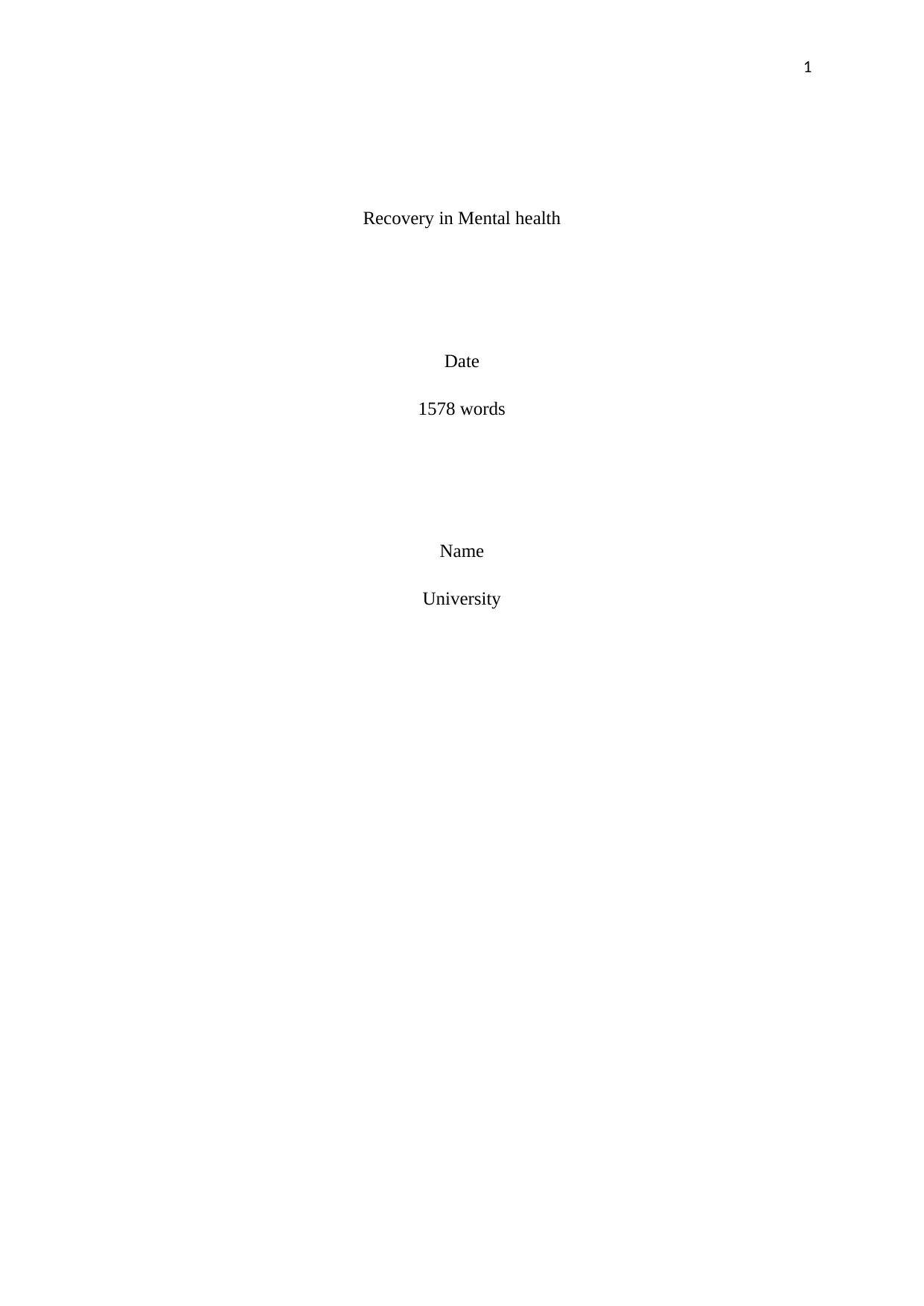
1
Recovery in Mental health
Date
1578 words
Name
University
Recovery in Mental health
Date
1578 words
Name
University
Paraphrase This Document
Need a fresh take? Get an instant paraphrase of this document with our AI Paraphraser
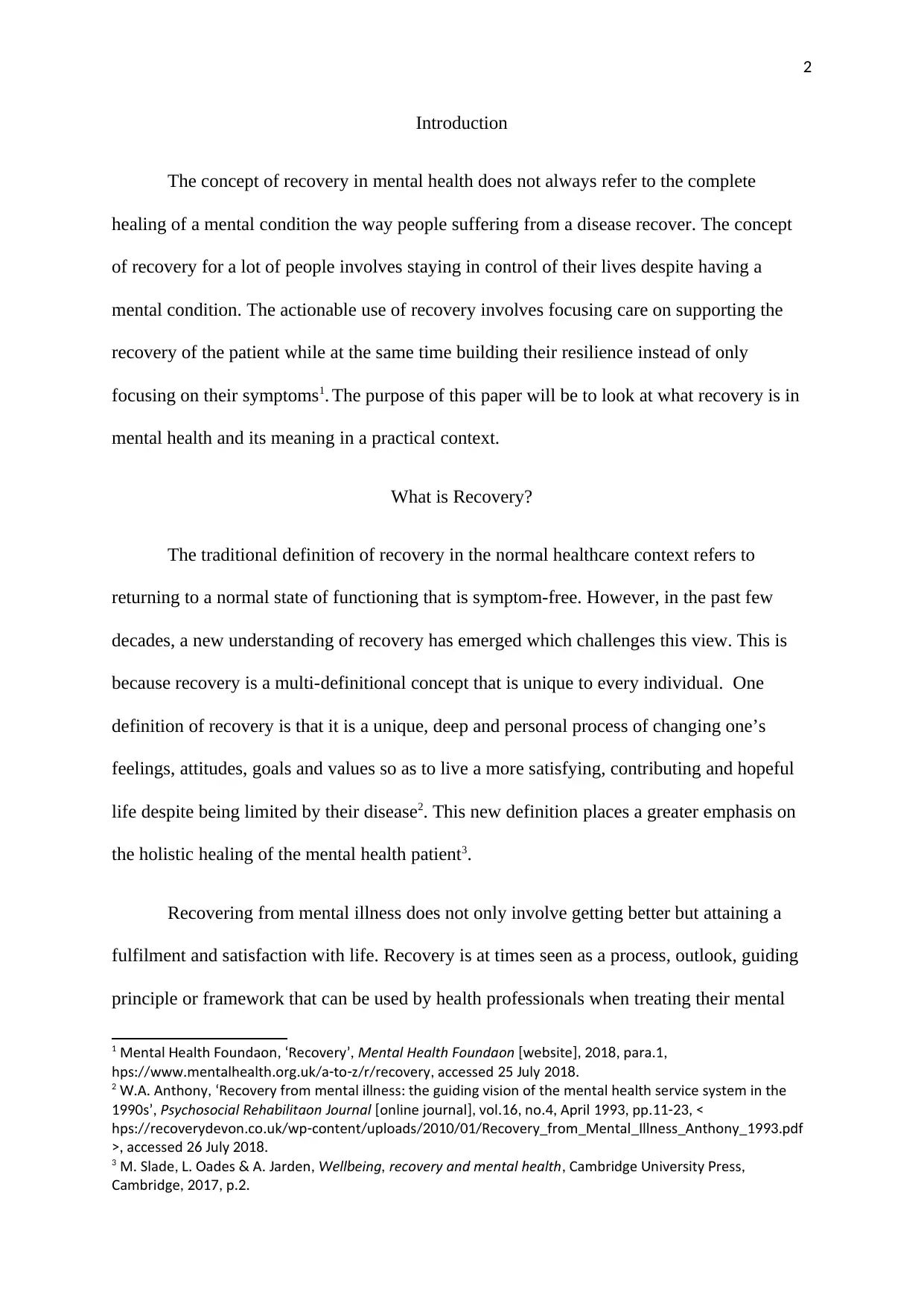
2
Introduction
The concept of recovery in mental health does not always refer to the complete
healing of a mental condition the way people suffering from a disease recover. The concept
of recovery for a lot of people involves staying in control of their lives despite having a
mental condition. The actionable use of recovery involves focusing care on supporting the
recovery of the patient while at the same time building their resilience instead of only
focusing on their symptoms1. The purpose of this paper will be to look at what recovery is in
mental health and its meaning in a practical context.
What is Recovery?
The traditional definition of recovery in the normal healthcare context refers to
returning to a normal state of functioning that is symptom-free. However, in the past few
decades, a new understanding of recovery has emerged which challenges this view. This is
because recovery is a multi-definitional concept that is unique to every individual. One
definition of recovery is that it is a unique, deep and personal process of changing one’s
feelings, attitudes, goals and values so as to live a more satisfying, contributing and hopeful
life despite being limited by their disease2. This new definition places a greater emphasis on
the holistic healing of the mental health patient3.
Recovering from mental illness does not only involve getting better but attaining a
fulfilment and satisfaction with life. Recovery is at times seen as a process, outlook, guiding
principle or framework that can be used by health professionals when treating their mental
1 Mental ealth oundation RecoveryH F , ‘ ’, Mental Health oundationF website para[ ], 2018, .1,
https www mentalhealth org uk a to z r recovery accessed uly:// . . . / - - / / , 25 J 2018.
2 A Anthony Recovery from mental illness the guiding vision of the mental health service system in theW. . , ‘ :
s1990 ’, Psychosocial eha ilitation ournalR b J online journal vol no April pp[ ], .16, .4, 1993, .11-23, <
https recoverydevon co uk wp content uploads Recovery from Mental llness Anthony pdf:// . . / - / /2010/01/ _ _ _I _ _1993.
accessed uly>, 26 J 2018.
3 M Slade ades A arden. , L. O & . J , ell eing recovery and mental healthW b , Cambridge niversity ress, U P ,
Cambridge p, 2017, .2.
Introduction
The concept of recovery in mental health does not always refer to the complete
healing of a mental condition the way people suffering from a disease recover. The concept
of recovery for a lot of people involves staying in control of their lives despite having a
mental condition. The actionable use of recovery involves focusing care on supporting the
recovery of the patient while at the same time building their resilience instead of only
focusing on their symptoms1. The purpose of this paper will be to look at what recovery is in
mental health and its meaning in a practical context.
What is Recovery?
The traditional definition of recovery in the normal healthcare context refers to
returning to a normal state of functioning that is symptom-free. However, in the past few
decades, a new understanding of recovery has emerged which challenges this view. This is
because recovery is a multi-definitional concept that is unique to every individual. One
definition of recovery is that it is a unique, deep and personal process of changing one’s
feelings, attitudes, goals and values so as to live a more satisfying, contributing and hopeful
life despite being limited by their disease2. This new definition places a greater emphasis on
the holistic healing of the mental health patient3.
Recovering from mental illness does not only involve getting better but attaining a
fulfilment and satisfaction with life. Recovery is at times seen as a process, outlook, guiding
principle or framework that can be used by health professionals when treating their mental
1 Mental ealth oundation RecoveryH F , ‘ ’, Mental Health oundationF website para[ ], 2018, .1,
https www mentalhealth org uk a to z r recovery accessed uly:// . . . / - - / / , 25 J 2018.
2 A Anthony Recovery from mental illness the guiding vision of the mental health service system in theW. . , ‘ :
s1990 ’, Psychosocial eha ilitation ournalR b J online journal vol no April pp[ ], .16, .4, 1993, .11-23, <
https recoverydevon co uk wp content uploads Recovery from Mental llness Anthony pdf:// . . / - / /2010/01/ _ _ _I _ _1993.
accessed uly>, 26 J 2018.
3 M Slade ades A arden. , L. O & . J , ell eing recovery and mental healthW b , Cambridge niversity ress, U P ,
Cambridge p, 2017, .2.
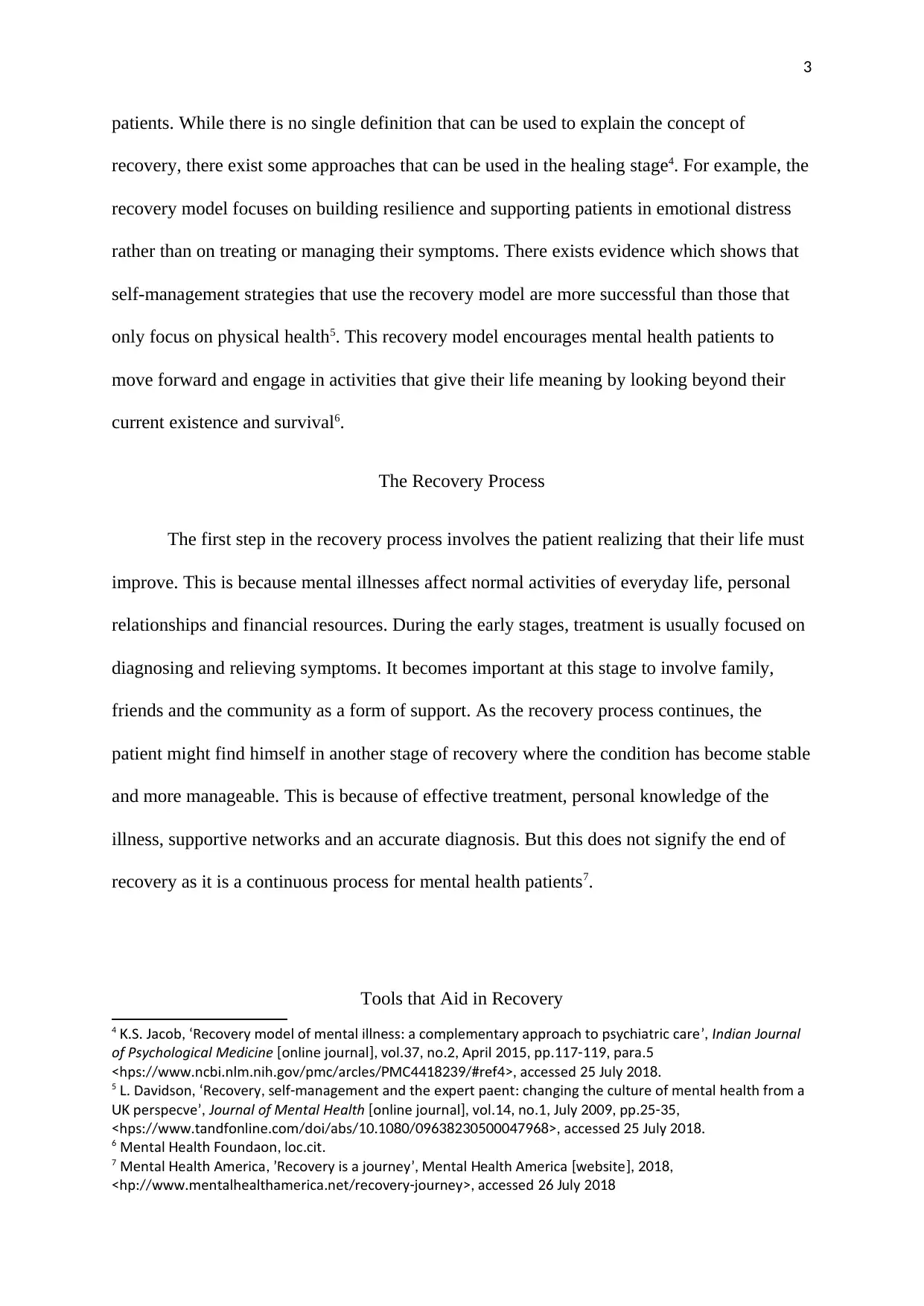
3
patients. While there is no single definition that can be used to explain the concept of
recovery, there exist some approaches that can be used in the healing stage4. For example, the
recovery model focuses on building resilience and supporting patients in emotional distress
rather than on treating or managing their symptoms. There exists evidence which shows that
self-management strategies that use the recovery model are more successful than those that
only focus on physical health5. This recovery model encourages mental health patients to
move forward and engage in activities that give their life meaning by looking beyond their
current existence and survival6.
The Recovery Process
The first step in the recovery process involves the patient realizing that their life must
improve. This is because mental illnesses affect normal activities of everyday life, personal
relationships and financial resources. During the early stages, treatment is usually focused on
diagnosing and relieving symptoms. It becomes important at this stage to involve family,
friends and the community as a form of support. As the recovery process continues, the
patient might find himself in another stage of recovery where the condition has become stable
and more manageable. This is because of effective treatment, personal knowledge of the
illness, supportive networks and an accurate diagnosis. But this does not signify the end of
recovery as it is a continuous process for mental health patients7.
Tools that Aid in Recovery
4 S acob Recovery model of mental illness a complementary approach to psychiatric careK. . J , ‘ : ’ ndian ournal, I J
of Psychological Medicine online journal vol no April pp para[ ], .37, .2, 2015, .117-119, .5
https www ncbi nlm nih gov pmc articles MC ref accessed uly< :// . . . . / / /P 4418239/# 4>, 25 J 2018.
5 Davidson Recovery self management and the e pert patient changing the culture of mental health from aL. , ‘ , - x :
perspectiveUK ’, ournal of Mental HealthJ online journal vol no uly pp[ ], .14, .1, J 2009, .25-35,
https www tandfonline com doi abs accessed uly< :// . . / / /10.1080/09638230500047968>, 25 J 2018.
6 Mental ealth oundation loc citH F , . .
7 Mental ealth America Recovery is a journey Mental ealth America websiteH , ’ ’, H [ ], 2018,
http www mentalhealthamerica net recovery journey accessed uly< :// . . / - >, 26 J 2018
patients. While there is no single definition that can be used to explain the concept of
recovery, there exist some approaches that can be used in the healing stage4. For example, the
recovery model focuses on building resilience and supporting patients in emotional distress
rather than on treating or managing their symptoms. There exists evidence which shows that
self-management strategies that use the recovery model are more successful than those that
only focus on physical health5. This recovery model encourages mental health patients to
move forward and engage in activities that give their life meaning by looking beyond their
current existence and survival6.
The Recovery Process
The first step in the recovery process involves the patient realizing that their life must
improve. This is because mental illnesses affect normal activities of everyday life, personal
relationships and financial resources. During the early stages, treatment is usually focused on
diagnosing and relieving symptoms. It becomes important at this stage to involve family,
friends and the community as a form of support. As the recovery process continues, the
patient might find himself in another stage of recovery where the condition has become stable
and more manageable. This is because of effective treatment, personal knowledge of the
illness, supportive networks and an accurate diagnosis. But this does not signify the end of
recovery as it is a continuous process for mental health patients7.
Tools that Aid in Recovery
4 S acob Recovery model of mental illness a complementary approach to psychiatric careK. . J , ‘ : ’ ndian ournal, I J
of Psychological Medicine online journal vol no April pp para[ ], .37, .2, 2015, .117-119, .5
https www ncbi nlm nih gov pmc articles MC ref accessed uly< :// . . . . / / /P 4418239/# 4>, 25 J 2018.
5 Davidson Recovery self management and the e pert patient changing the culture of mental health from aL. , ‘ , - x :
perspectiveUK ’, ournal of Mental HealthJ online journal vol no uly pp[ ], .14, .1, J 2009, .25-35,
https www tandfonline com doi abs accessed uly< :// . . / / /10.1080/09638230500047968>, 25 J 2018.
6 Mental ealth oundation loc citH F , . .
7 Mental ealth America Recovery is a journey Mental ealth America websiteH , ’ ’, H [ ], 2018,
http www mentalhealthamerica net recovery journey accessed uly< :// . . / - >, 26 J 2018
⊘ This is a preview!⊘
Do you want full access?
Subscribe today to unlock all pages.

Trusted by 1+ million students worldwide
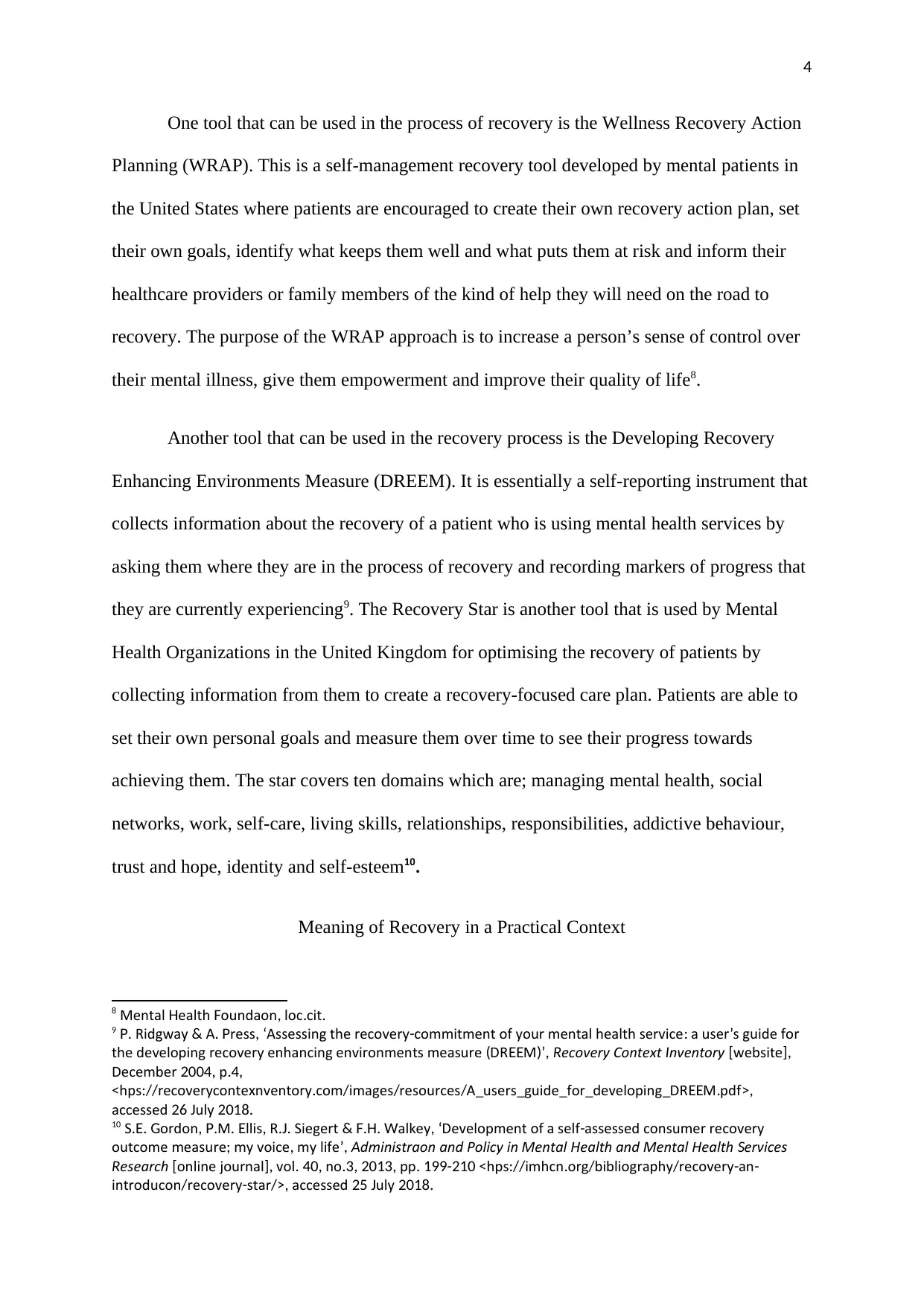
4
One tool that can be used in the process of recovery is the Wellness Recovery Action
Planning (WRAP). This is a self-management recovery tool developed by mental patients in
the United States where patients are encouraged to create their own recovery action plan, set
their own goals, identify what keeps them well and what puts them at risk and inform their
healthcare providers or family members of the kind of help they will need on the road to
recovery. The purpose of the WRAP approach is to increase a person’s sense of control over
their mental illness, give them empowerment and improve their quality of life8.
Another tool that can be used in the recovery process is the Developing Recovery
Enhancing Environments Measure (DREEM). It is essentially a self-reporting instrument that
collects information about the recovery of a patient who is using mental health services by
asking them where they are in the process of recovery and recording markers of progress that
they are currently experiencing9. The Recovery Star is another tool that is used by Mental
Health Organizations in the United Kingdom for optimising the recovery of patients by
collecting information from them to create a recovery-focused care plan. Patients are able to
set their own personal goals and measure them over time to see their progress towards
achieving them. The star covers ten domains which are; managing mental health, social
networks, work, self-care, living skills, relationships, responsibilities, addictive behaviour,
trust and hope, identity and self-esteem10.
Meaning of Recovery in a Practical Context
8 Mental ealth oundation loc citH F , . .
9 Ridgway A ress Assessing the recovery commitment of your mental health service a user s guide forP. & . P , ‘ - : ’
the developing recovery enhancing environments measure DR M( EE )’, ecovery Context nventoryR I website[ ],
December p2004, .4,
https recoveryconte ti nventory com images resources A users guide for developing DR M pdf< :// x . / / / _ _ _ _ _ EE . >,
accessed uly26 J 2018.
10 S ordon M llis R Siegert alkey Development of a self assessed consumer recovery.E. G , P. . E , .J. & F.H. W , ‘ -
outcome measure my voice my life; , ’, Administration and Policy in Mental Health and Mental Health ervicesS
esearchR online journal vol no pp https imhcn org bibliography recovery an[ ], . 40, .3, 2013, . 199-210 < :// . / / - -
introduction recovery star accessed uly/ - />, 25 J 2018.
One tool that can be used in the process of recovery is the Wellness Recovery Action
Planning (WRAP). This is a self-management recovery tool developed by mental patients in
the United States where patients are encouraged to create their own recovery action plan, set
their own goals, identify what keeps them well and what puts them at risk and inform their
healthcare providers or family members of the kind of help they will need on the road to
recovery. The purpose of the WRAP approach is to increase a person’s sense of control over
their mental illness, give them empowerment and improve their quality of life8.
Another tool that can be used in the recovery process is the Developing Recovery
Enhancing Environments Measure (DREEM). It is essentially a self-reporting instrument that
collects information about the recovery of a patient who is using mental health services by
asking them where they are in the process of recovery and recording markers of progress that
they are currently experiencing9. The Recovery Star is another tool that is used by Mental
Health Organizations in the United Kingdom for optimising the recovery of patients by
collecting information from them to create a recovery-focused care plan. Patients are able to
set their own personal goals and measure them over time to see their progress towards
achieving them. The star covers ten domains which are; managing mental health, social
networks, work, self-care, living skills, relationships, responsibilities, addictive behaviour,
trust and hope, identity and self-esteem10.
Meaning of Recovery in a Practical Context
8 Mental ealth oundation loc citH F , . .
9 Ridgway A ress Assessing the recovery commitment of your mental health service a user s guide forP. & . P , ‘ - : ’
the developing recovery enhancing environments measure DR M( EE )’, ecovery Context nventoryR I website[ ],
December p2004, .4,
https recoveryconte ti nventory com images resources A users guide for developing DR M pdf< :// x . / / / _ _ _ _ _ EE . >,
accessed uly26 J 2018.
10 S ordon M llis R Siegert alkey Development of a self assessed consumer recovery.E. G , P. . E , .J. & F.H. W , ‘ -
outcome measure my voice my life; , ’, Administration and Policy in Mental Health and Mental Health ervicesS
esearchR online journal vol no pp https imhcn org bibliography recovery an[ ], . 40, .3, 2013, . 199-210 < :// . / / - -
introduction recovery star accessed uly/ - />, 25 J 2018.
Paraphrase This Document
Need a fresh take? Get an instant paraphrase of this document with our AI Paraphraser
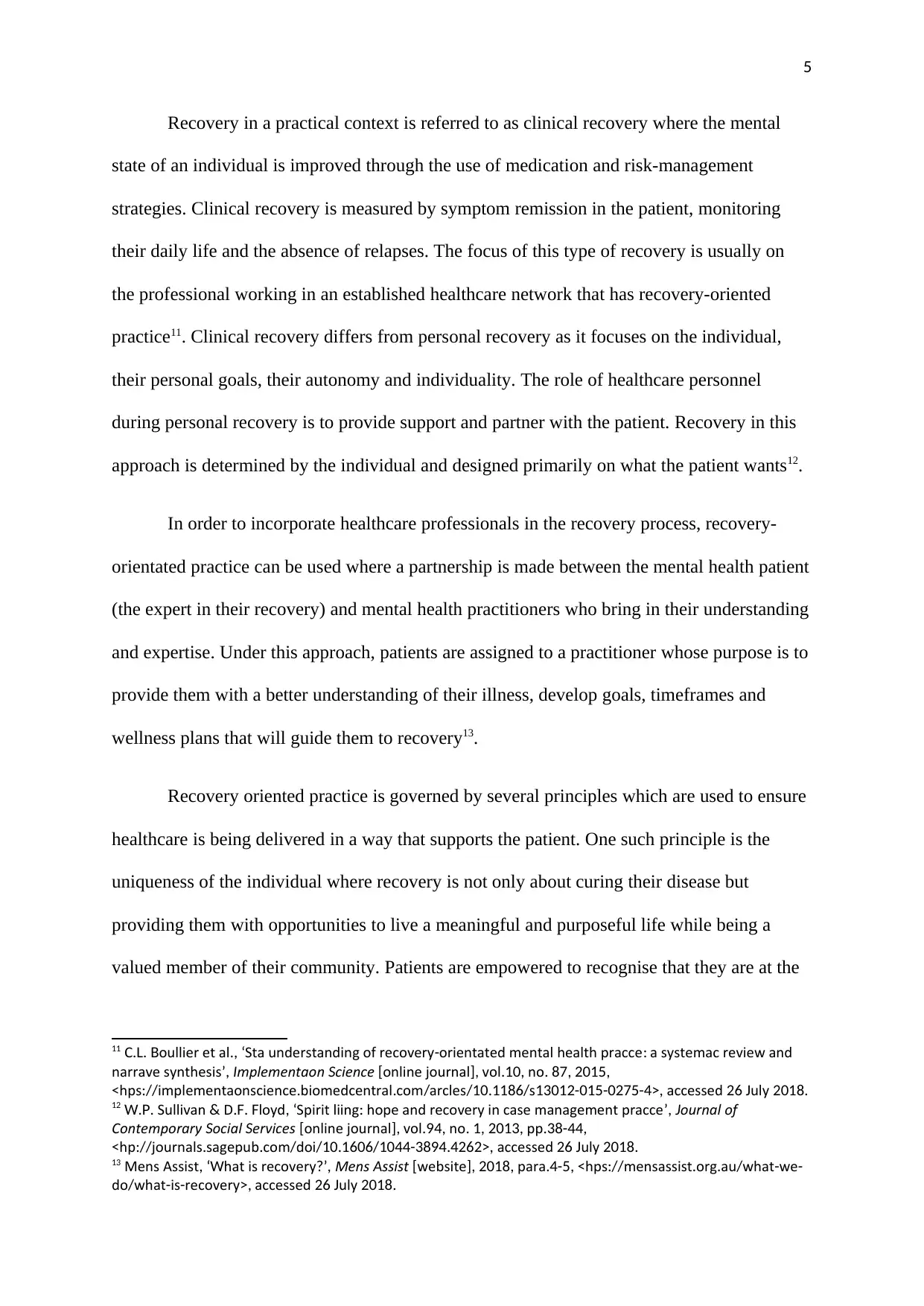
5
Recovery in a practical context is referred to as clinical recovery where the mental
state of an individual is improved through the use of medication and risk-management
strategies. Clinical recovery is measured by symptom remission in the patient, monitoring
their daily life and the absence of relapses. The focus of this type of recovery is usually on
the professional working in an established healthcare network that has recovery-oriented
practice11. Clinical recovery differs from personal recovery as it focuses on the individual,
their personal goals, their autonomy and individuality. The role of healthcare personnel
during personal recovery is to provide support and partner with the patient. Recovery in this
approach is determined by the individual and designed primarily on what the patient wants12.
In order to incorporate healthcare professionals in the recovery process, recovery-
orientated practice can be used where a partnership is made between the mental health patient
(the expert in their recovery) and mental health practitioners who bring in their understanding
and expertise. Under this approach, patients are assigned to a practitioner whose purpose is to
provide them with a better understanding of their illness, develop goals, timeframes and
wellness plans that will guide them to recovery13.
Recovery oriented practice is governed by several principles which are used to ensure
healthcare is being delivered in a way that supports the patient. One such principle is the
uniqueness of the individual where recovery is not only about curing their disease but
providing them with opportunities to live a meaningful and purposeful life while being a
valued member of their community. Patients are empowered to recognise that they are at the
11 C outillier et al Staff understanding of recovery orientated mental health practice a systematic review and.L. B ., ‘ - :
narrative synthesis’, mplementation cienceI S online journal vol no[ ], .10, . 87, 2015,
https implementationscience biomedcentral com articles s accessed uly< :// . . / /10.1186/ 13012-015-0275-4>, 26 J 2018.
12 Sullivan D loyd Spirit lifting hope and recovery in case management practiceW.P. & .F. F , ‘ : ’, ournal ofJ
Contemporary ocial ervicesS S online journal vol no pp[ ], .94, . 1, 2013, .38-44,
http journals sagepub com doi accessed uly< :// . . / /10.1606/1044-3894.4262>, 26 J 2018.
13 Mentis Assist hat is recovery, ‘W ?’, Mentis ssistA website para https mentisassist org au what we[ ], 2018, .4-5, < :// . . / - -
do what is recovery accessed uly/ - - >, 26 J 2018.
Recovery in a practical context is referred to as clinical recovery where the mental
state of an individual is improved through the use of medication and risk-management
strategies. Clinical recovery is measured by symptom remission in the patient, monitoring
their daily life and the absence of relapses. The focus of this type of recovery is usually on
the professional working in an established healthcare network that has recovery-oriented
practice11. Clinical recovery differs from personal recovery as it focuses on the individual,
their personal goals, their autonomy and individuality. The role of healthcare personnel
during personal recovery is to provide support and partner with the patient. Recovery in this
approach is determined by the individual and designed primarily on what the patient wants12.
In order to incorporate healthcare professionals in the recovery process, recovery-
orientated practice can be used where a partnership is made between the mental health patient
(the expert in their recovery) and mental health practitioners who bring in their understanding
and expertise. Under this approach, patients are assigned to a practitioner whose purpose is to
provide them with a better understanding of their illness, develop goals, timeframes and
wellness plans that will guide them to recovery13.
Recovery oriented practice is governed by several principles which are used to ensure
healthcare is being delivered in a way that supports the patient. One such principle is the
uniqueness of the individual where recovery is not only about curing their disease but
providing them with opportunities to live a meaningful and purposeful life while being a
valued member of their community. Patients are empowered to recognise that they are at the
11 C outillier et al Staff understanding of recovery orientated mental health practice a systematic review and.L. B ., ‘ - :
narrative synthesis’, mplementation cienceI S online journal vol no[ ], .10, . 87, 2015,
https implementationscience biomedcentral com articles s accessed uly< :// . . / /10.1186/ 13012-015-0275-4>, 26 J 2018.
12 Sullivan D loyd Spirit lifting hope and recovery in case management practiceW.P. & .F. F , ‘ : ’, ournal ofJ
Contemporary ocial ervicesS S online journal vol no pp[ ], .94, . 1, 2013, .38-44,
http journals sagepub com doi accessed uly< :// . . / /10.1606/1044-3894.4262>, 26 J 2018.
13 Mentis Assist hat is recovery, ‘W ?’, Mentis ssistA website para https mentisassist org au what we[ ], 2018, .4-5, < :// . . / - -
do what is recovery accessed uly/ - - >, 26 J 2018.
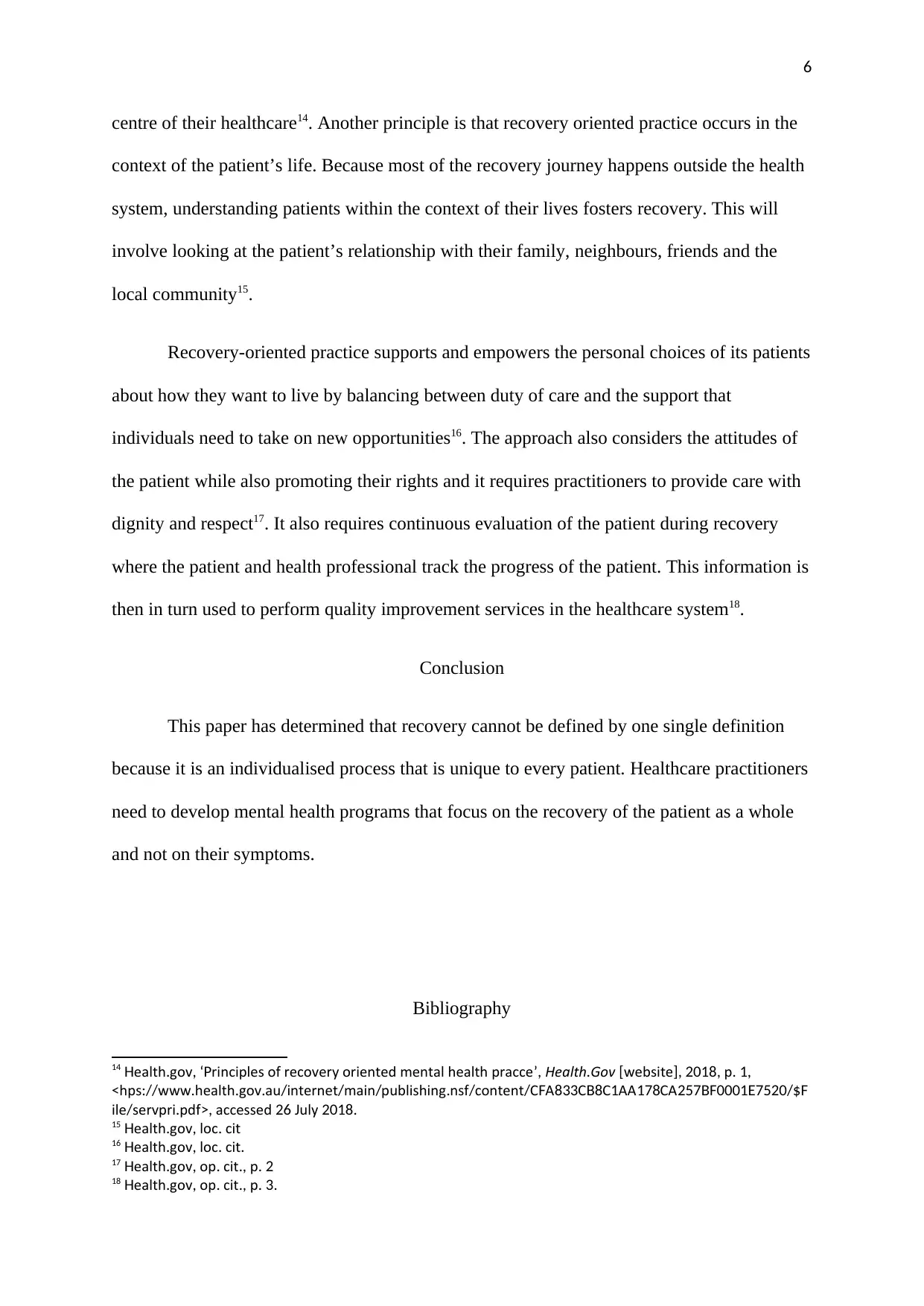
6
centre of their healthcare14. Another principle is that recovery oriented practice occurs in the
context of the patient’s life. Because most of the recovery journey happens outside the health
system, understanding patients within the context of their lives fosters recovery. This will
involve looking at the patient’s relationship with their family, neighbours, friends and the
local community15.
Recovery-oriented practice supports and empowers the personal choices of its patients
about how they want to live by balancing between duty of care and the support that
individuals need to take on new opportunities16. The approach also considers the attitudes of
the patient while also promoting their rights and it requires practitioners to provide care with
dignity and respect17. It also requires continuous evaluation of the patient during recovery
where the patient and health professional track the progress of the patient. This information is
then in turn used to perform quality improvement services in the healthcare system18.
Conclusion
This paper has determined that recovery cannot be defined by one single definition
because it is an individualised process that is unique to every patient. Healthcare practitioners
need to develop mental health programs that focus on the recovery of the patient as a whole
and not on their symptoms.
Bibliography
14 ealth gov rinciples of recovery oriented mental health practiceH . , ‘P ’, Health Gov. website p[ ], 2018, . 1,
https www health gov au internet main publishing nsf content C A C C AA CA< :// . . . / / / . / / F 833 B8 1 178 257BF0001E7520/$F
ile servpri pdf accessed uly/ . >, 26 J 2018.
15 ealth gov loc citH . , .
16 ealth gov loc citH . , . .
17 ealth gov op cit pH . , . ., . 2
18 ealth gov op cit pH . , . ., . 3.
centre of their healthcare14. Another principle is that recovery oriented practice occurs in the
context of the patient’s life. Because most of the recovery journey happens outside the health
system, understanding patients within the context of their lives fosters recovery. This will
involve looking at the patient’s relationship with their family, neighbours, friends and the
local community15.
Recovery-oriented practice supports and empowers the personal choices of its patients
about how they want to live by balancing between duty of care and the support that
individuals need to take on new opportunities16. The approach also considers the attitudes of
the patient while also promoting their rights and it requires practitioners to provide care with
dignity and respect17. It also requires continuous evaluation of the patient during recovery
where the patient and health professional track the progress of the patient. This information is
then in turn used to perform quality improvement services in the healthcare system18.
Conclusion
This paper has determined that recovery cannot be defined by one single definition
because it is an individualised process that is unique to every patient. Healthcare practitioners
need to develop mental health programs that focus on the recovery of the patient as a whole
and not on their symptoms.
Bibliography
14 ealth gov rinciples of recovery oriented mental health practiceH . , ‘P ’, Health Gov. website p[ ], 2018, . 1,
https www health gov au internet main publishing nsf content C A C C AA CA< :// . . . / / / . / / F 833 B8 1 178 257BF0001E7520/$F
ile servpri pdf accessed uly/ . >, 26 J 2018.
15 ealth gov loc citH . , .
16 ealth gov loc citH . , . .
17 ealth gov op cit pH . , . ., . 2
18 ealth gov op cit pH . , . ., . 3.
⊘ This is a preview!⊘
Do you want full access?
Subscribe today to unlock all pages.

Trusted by 1+ million students worldwide
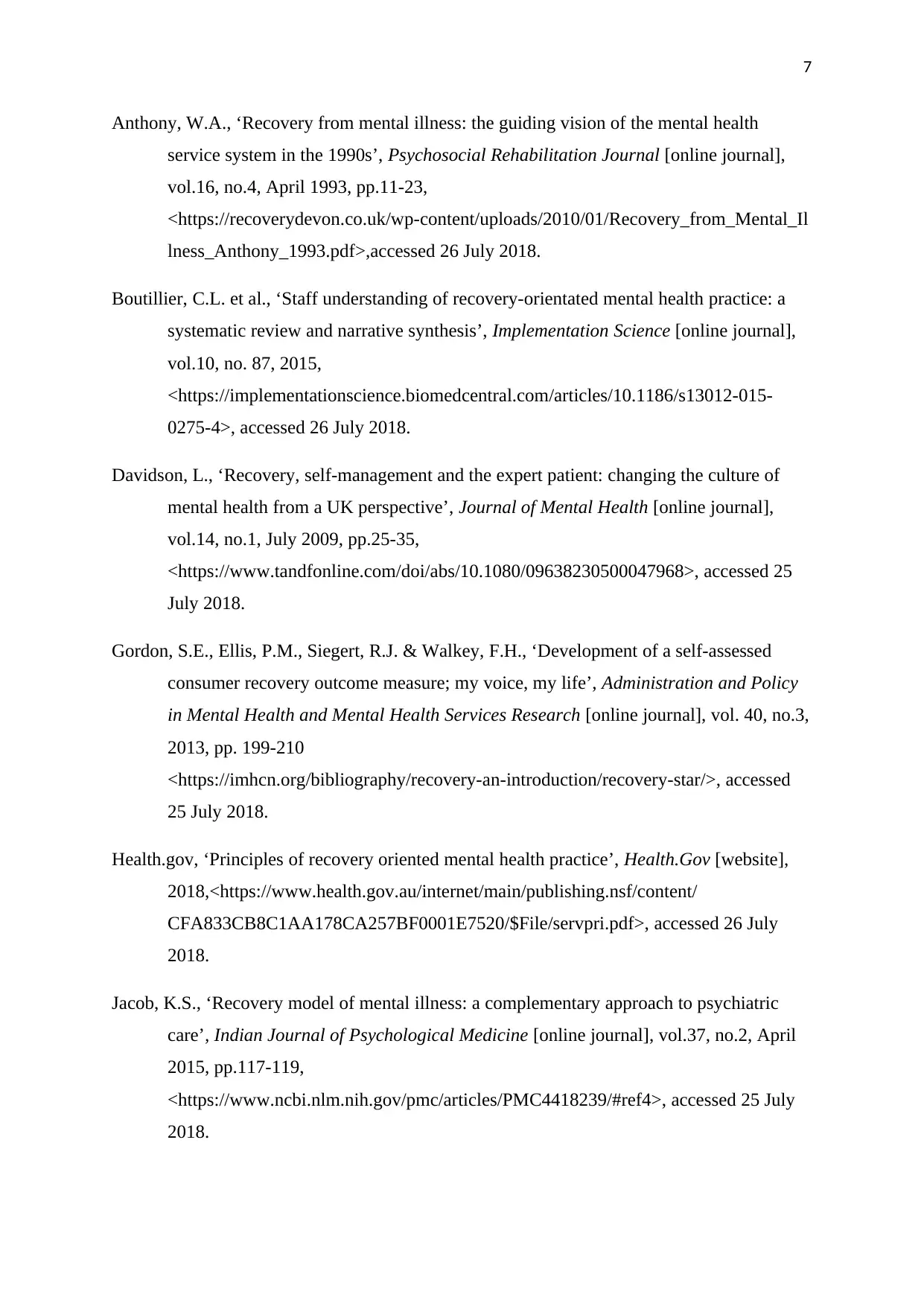
7
Anthony, W.A., ‘Recovery from mental illness: the guiding vision of the mental health
service system in the 1990s’, Psychosocial Rehabilitation Journal [online journal],
vol.16, no.4, April 1993, pp.11-23,
<https://recoverydevon.co.uk/wp-content/uploads/2010/01/Recovery_from_Mental_Il
lness_Anthony_1993.pdf>,accessed 26 July 2018.
Boutillier, C.L. et al., ‘Staff understanding of recovery-orientated mental health practice: a
systematic review and narrative synthesis’, Implementation Science [online journal],
vol.10, no. 87, 2015,
<https://implementationscience.biomedcentral.com/articles/10.1186/s13012-015-
0275-4>, accessed 26 July 2018.
Davidson, L., ‘Recovery, self-management and the expert patient: changing the culture of
mental health from a UK perspective’, Journal of Mental Health [online journal],
vol.14, no.1, July 2009, pp.25-35,
<https://www.tandfonline.com/doi/abs/10.1080/09638230500047968>, accessed 25
July 2018.
Gordon, S.E., Ellis, P.M., Siegert, R.J. & Walkey, F.H., ‘Development of a self-assessed
consumer recovery outcome measure; my voice, my life’, Administration and Policy
in Mental Health and Mental Health Services Research [online journal], vol. 40, no.3,
2013, pp. 199-210
<https://imhcn.org/bibliography/recovery-an-introduction/recovery-star/>, accessed
25 July 2018.
Health.gov, ‘Principles of recovery oriented mental health practice’, Health.Gov [website],
2018,<https://www.health.gov.au/internet/main/publishing.nsf/content/
CFA833CB8C1AA178CA257BF0001E7520/$File/servpri.pdf>, accessed 26 July
2018.
Jacob, K.S., ‘Recovery model of mental illness: a complementary approach to psychiatric
care’, Indian Journal of Psychological Medicine [online journal], vol.37, no.2, April
2015, pp.117-119,
<https://www.ncbi.nlm.nih.gov/pmc/articles/PMC4418239/#ref4>, accessed 25 July
2018.
Anthony, W.A., ‘Recovery from mental illness: the guiding vision of the mental health
service system in the 1990s’, Psychosocial Rehabilitation Journal [online journal],
vol.16, no.4, April 1993, pp.11-23,
<https://recoverydevon.co.uk/wp-content/uploads/2010/01/Recovery_from_Mental_Il
lness_Anthony_1993.pdf>,accessed 26 July 2018.
Boutillier, C.L. et al., ‘Staff understanding of recovery-orientated mental health practice: a
systematic review and narrative synthesis’, Implementation Science [online journal],
vol.10, no. 87, 2015,
<https://implementationscience.biomedcentral.com/articles/10.1186/s13012-015-
0275-4>, accessed 26 July 2018.
Davidson, L., ‘Recovery, self-management and the expert patient: changing the culture of
mental health from a UK perspective’, Journal of Mental Health [online journal],
vol.14, no.1, July 2009, pp.25-35,
<https://www.tandfonline.com/doi/abs/10.1080/09638230500047968>, accessed 25
July 2018.
Gordon, S.E., Ellis, P.M., Siegert, R.J. & Walkey, F.H., ‘Development of a self-assessed
consumer recovery outcome measure; my voice, my life’, Administration and Policy
in Mental Health and Mental Health Services Research [online journal], vol. 40, no.3,
2013, pp. 199-210
<https://imhcn.org/bibliography/recovery-an-introduction/recovery-star/>, accessed
25 July 2018.
Health.gov, ‘Principles of recovery oriented mental health practice’, Health.Gov [website],
2018,<https://www.health.gov.au/internet/main/publishing.nsf/content/
CFA833CB8C1AA178CA257BF0001E7520/$File/servpri.pdf>, accessed 26 July
2018.
Jacob, K.S., ‘Recovery model of mental illness: a complementary approach to psychiatric
care’, Indian Journal of Psychological Medicine [online journal], vol.37, no.2, April
2015, pp.117-119,
<https://www.ncbi.nlm.nih.gov/pmc/articles/PMC4418239/#ref4>, accessed 25 July
2018.
Paraphrase This Document
Need a fresh take? Get an instant paraphrase of this document with our AI Paraphraser
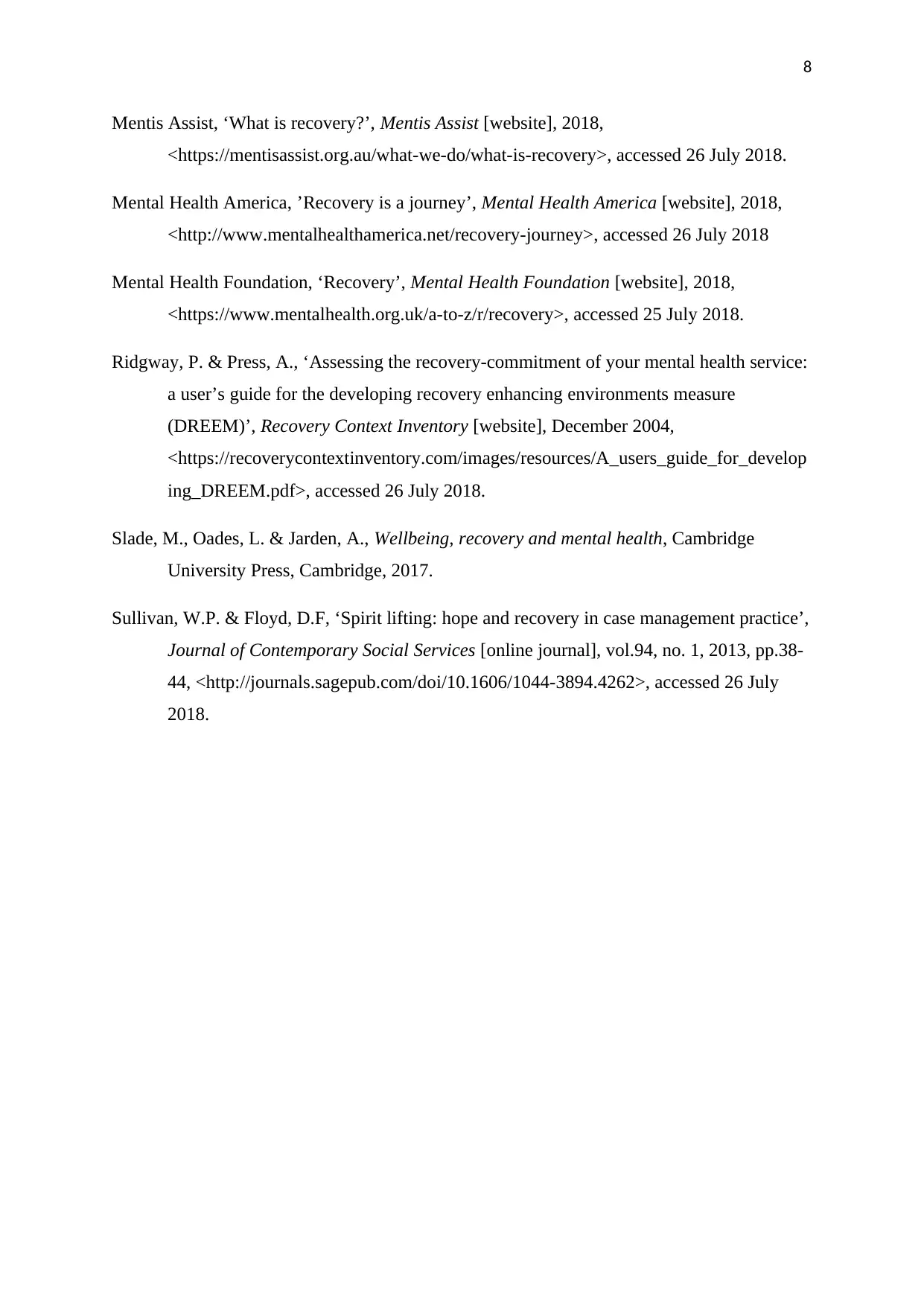
8
Mentis Assist, ‘What is recovery?’, Mentis Assist [website], 2018,
<https://mentisassist.org.au/what-we-do/what-is-recovery>, accessed 26 July 2018.
Mental Health America, ’Recovery is a journey’, Mental Health America [website], 2018,
<http://www.mentalhealthamerica.net/recovery-journey>, accessed 26 July 2018
Mental Health Foundation, ‘Recovery’, Mental Health Foundation [website], 2018,
<https://www.mentalhealth.org.uk/a-to-z/r/recovery>, accessed 25 July 2018.
Ridgway, P. & Press, A., ‘Assessing the recovery-commitment of your mental health service:
a user’s guide for the developing recovery enhancing environments measure
(DREEM)’, Recovery Context Inventory [website], December 2004,
<https://recoverycontextinventory.com/images/resources/A_users_guide_for_develop
ing_DREEM.pdf>, accessed 26 July 2018.
Slade, M., Oades, L. & Jarden, A., Wellbeing, recovery and mental health, Cambridge
University Press, Cambridge, 2017.
Sullivan, W.P. & Floyd, D.F, ‘Spirit lifting: hope and recovery in case management practice’,
Journal of Contemporary Social Services [online journal], vol.94, no. 1, 2013, pp.38-
44, <http://journals.sagepub.com/doi/10.1606/1044-3894.4262>, accessed 26 July
2018.
Mentis Assist, ‘What is recovery?’, Mentis Assist [website], 2018,
<https://mentisassist.org.au/what-we-do/what-is-recovery>, accessed 26 July 2018.
Mental Health America, ’Recovery is a journey’, Mental Health America [website], 2018,
<http://www.mentalhealthamerica.net/recovery-journey>, accessed 26 July 2018
Mental Health Foundation, ‘Recovery’, Mental Health Foundation [website], 2018,
<https://www.mentalhealth.org.uk/a-to-z/r/recovery>, accessed 25 July 2018.
Ridgway, P. & Press, A., ‘Assessing the recovery-commitment of your mental health service:
a user’s guide for the developing recovery enhancing environments measure
(DREEM)’, Recovery Context Inventory [website], December 2004,
<https://recoverycontextinventory.com/images/resources/A_users_guide_for_develop
ing_DREEM.pdf>, accessed 26 July 2018.
Slade, M., Oades, L. & Jarden, A., Wellbeing, recovery and mental health, Cambridge
University Press, Cambridge, 2017.
Sullivan, W.P. & Floyd, D.F, ‘Spirit lifting: hope and recovery in case management practice’,
Journal of Contemporary Social Services [online journal], vol.94, no. 1, 2013, pp.38-
44, <http://journals.sagepub.com/doi/10.1606/1044-3894.4262>, accessed 26 July
2018.
1 out of 8
Related Documents
Your All-in-One AI-Powered Toolkit for Academic Success.
+13062052269
info@desklib.com
Available 24*7 on WhatsApp / Email
![[object Object]](/_next/static/media/star-bottom.7253800d.svg)
Unlock your academic potential
Copyright © 2020–2026 A2Z Services. All Rights Reserved. Developed and managed by ZUCOL.





